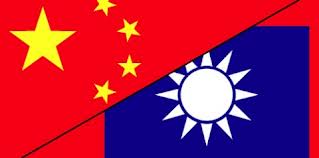Following the historic November meeting between Chinese President Xi Jinping and Taiwanese counterpart Ma Ying-jeou in Singapore—the first of its kind since the end of the civil war in 1949—officials from China and Taiwan for the first time spoke over a new cross-strait hotline. AP’s Christopher Bodeen reports:
The link that went into service Wednesday represents an upgrade in contact between the sides by connecting the heads of the two Cabinet-level agencies responsible for their relations, Taiwan’s Mainland Affairs Council and China’s Taiwan Affairs Office.
[…] Taiwan Affairs Office spokesman Ma Xiaoguang told reporters in Beijing that the new hotline would ease communication on important issues and help enhance mutual trust and understanding.
“We hope the two authorities will make efforts to maintain and promote the peaceful development of cross-Strait relations,” said Ma, who also referenced China’s demand that Taiwan recognize it is a part of China.
[…] However, [despite the warming of cross-trait relations under Ma] China and Taiwan are now moving into a period of uncertainty, with Ma leaving office next year and opposition Democratic Progressive Party candidate Tsai Ing-wen touted to win next month’s presidential election.
Tsai’s DPP backs Taiwan’s formal independence, and she has refused to endorse Beijing’s demand that she recognize the island and mainland as part of a single Chinese nation. [Source]
Taiwan will choose its new president on January 16, and victory is expected for pro-independence Tsai Ing-wen. With the inauguration of the new hotline also came a pre-election warning from Beijing, reports The Washington Post’s Simon Denyer:
Unless the winner of those elections explicitly endorses the idea that China and Taiwan are one country, the entire dialogue process between the two sides “will inevitably be affected and could even collapse,” [Ma Xiaogang] a senior official in Beijing warned.
[…] The “one China” principle, agreed to in 1992, allows both sides to claim to be rightful rulers of the Chinese nation, but explicitly closes the door to the idea that Taiwan could one day become an independent nation, a concept that is anathema to Beijing.
The 1992 consensus, as it is known, was hammered out by China’s Communist Party and Taiwan’s Nationalist Party, or Kuomintang, and has underpinned a deepening of trade and diplomatic ties between the two sides, culminating in a historic meeting of the their respective presidents in November.
At that meeting, both sides took pains to stress that the summit had only been possible because of the 1992 consensus. That was seen as a pre-election message to Taiwanese voters, and to the opposition and more independence-minded Democratic People’s Party (DPP), which has never endorsed the “one China” idea.
[…] “As long we have sincere communication, I believe cross-strait relations can be stable,” Tsai [Ing-wen] said, according to Bloomberg. “The 1992 consensus is one option, but it’s not the only option. It is inappropriate to continue to frame it as such.” [Source]
At the University of Nottingham’s China Policy Institute Blog, J. Michael Cole analyzes the threat in the context of Taiwan’s current political climate, concluding that Beijing is likely to negotiate with an expected President Tsai Ing-wen:
[…] While ominous, such threats should be taken in their proper context. For one thing, Mr. Ma’s comments were ostensibly an attempt by Beijing to corner Ms. Tsai and to give her opponent from the KMT, Eric Chu, a much-needed boost.
Beyond that, we should note that Beijing’s rigid official rhetoric is not necessarily an indicator of policy. Oftentimes it is what Chinese officials have to say, and the principal audience is domestic rather than external. In many ways, Beijing has been hostage to its own rhetoric and ideology, so much so that to depart from the official line could be interpreted domestically as a sign of weakness on the part of the Chinese Communist Party (CCP).
Given Ms. Tsai’s repeated vows to maintain the “status quo” in the Taiwan Strait, as well as her commitment to engaging China constructively and “with sincerity,” Beijing would be shooting itself in the foot if, come May 20, it suddenly “collapsed” dialogue with Taipei, a decision that could only succeed in propelling Taiwan away from China and undo eight years of normalization that, by almost every yardstick, were politically beneficial to Beijing. Notwithstanding the TAO’s rhetoric and the more extremist elements in the CCP who would choose to act on its threats, we can therefore expect that Beijing will act pragmatically in the initial phase of a Tsai administration, during which it would assess her commitment to dialogue and continuity (keen on improving Taiwan’s moribund economy, Ms. Tsai knows all too well that unduly alienating the world’s second-largest economy and Taiwan’s No. trading partner is not a viable policy). […] [Source]








